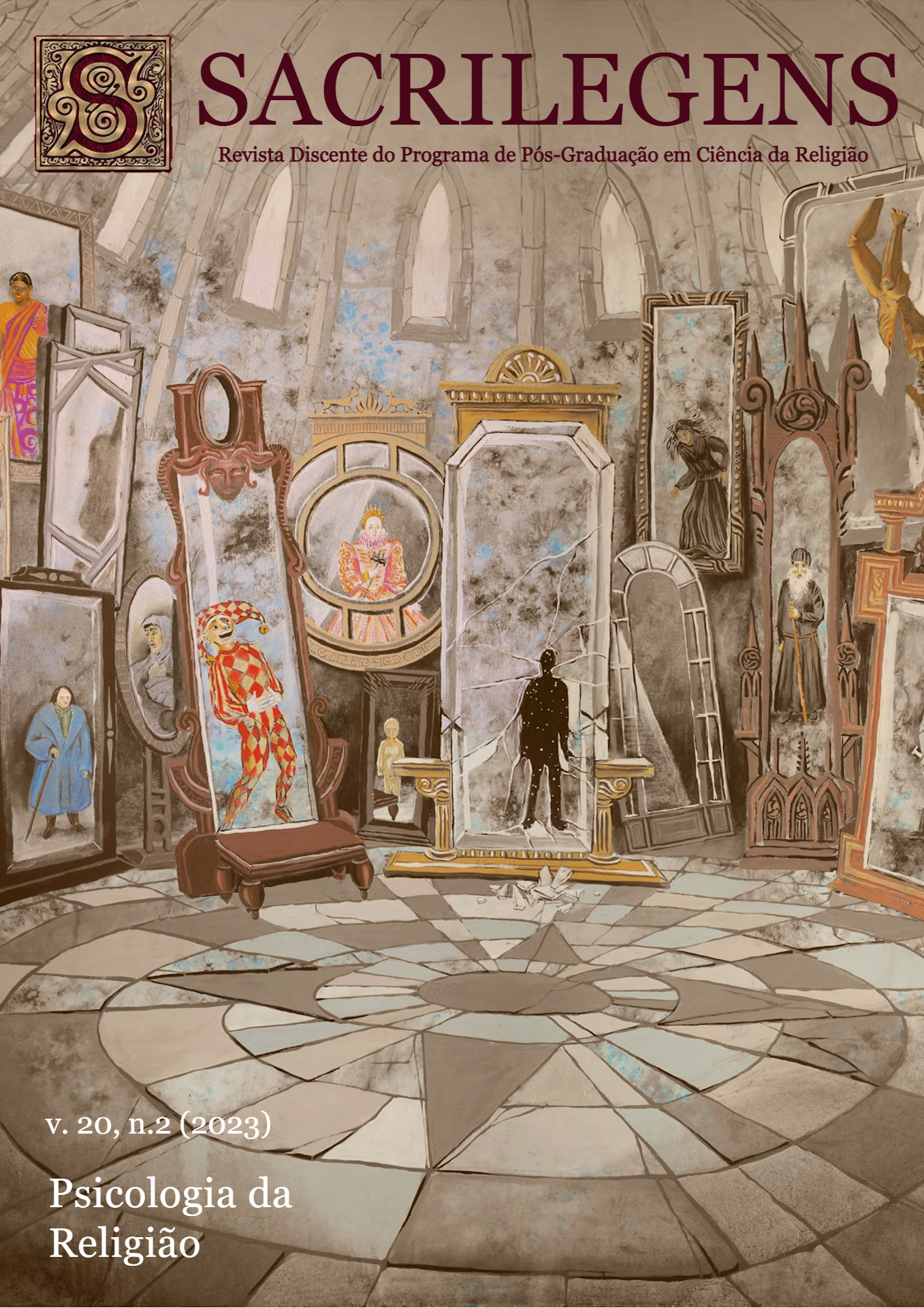Relationship of young users of digital social networks with the sacred
um estudo sobre o sagrado no Instagram
Keywords:
Spirituality, Religion, Sacred, Youth, PsychologyAbstract
Brazilian society is largely characterized by its religiosity. Psychology in Brazil has not developed a field of study dedicated to religious phenomena to the point of including it as a mandatory subject in undergraduate courses. The objective of this study is to profile the spiritual and religious experience of young social media users. An online structured questionnaire containing 23 multiple-choice questions was administered. 572 responses were obtained. The participants had a profile of being enrolled in higher education, who understand spirituality as a path of life, considering themselves spiritual, but not religious. The vast majority experience spirituality differently from their family and just over half practice individually.
Downloads
References
BARBIERI, E. A Sacralidade Da Natureza. Revista Relicário, v. 6, n. 11, p. 7–28, 2019. Disponível em: https://doi.org/10.46731/RELICARIO-v6n11-2019-116
BILEWICZ, M.; SORAL, W.. Hate speech epidemic. The dynamic effects of derogatory language on intergroup relations and political radicalization. Political Psychology, v. 41, p. 3-33, 2020. Disponível: https://onlinelibrary.wiley.com/doi/abs/10.1111/pops.12670
COLLARES-DA-ROCHA, J. C. C.; SOUZA FILHO, E. A. D. Representação social do pecado segundo grupos religiosos. Psicologia & Sociedade, v. 26, pp. 235-244. https://doi.org/10.1590/S0102-71822014000100025
CONJUVE. Conselho Nacional de Juventude et al (Org.) Política nacional de juventude: diretrizes e perspectivas. São Paulo: Fundação Friedrich Ebert, 2006. https://www.prattein.com.br/home/images/stories/Juventude/Politica_Nacional_de_Juventude.pdf
CONSELHO NACIONAL DE SAÚDE. Resolução Nº 466, de 12 de Dezembro de 2012. Dispõe sobre Diretrizes e normas regulamentadoras de pesquisas envolvendo seres humanos. Brasília: Ministério da Saúde, 2012. Disponivel em: https://bvsms.saude.gov.br/bvs/saudelegis/cns/2013/res0466_12_12_2012.html
COTTER, C.; ROBERTSON, D. Introduction: The world religions paradigm in contemporary religious studies. In: After World Religions. Routledge, 2016, p. 1-20.
DURKHEIM, É. As formas elementares da vida religiosa. São Paulo: Livraria Martins Fontes, 1996. (Obra original publicada em 1912).
FREITAS, M. H.. Psicologia religiosa, psicologia da religião/espiritualidade, ou psicologia e religião/espiritualidade?. Revista Pistis & Praxis: Teologia e Pastoral, v. 9, n. 1, p. 89-108, 2017. Disponível em: https://www.redalyc.org/pdf/4497/449755229006.pdf
HANEGRAAFF, W. J. New age religion and western culture: Esotericism in the mirror of secular thought. New York: E.J. Brill, 1996.
HANEGRAAFF, W. J. Definindo religião, apesar da história. Tradução de Fabio L. Stern. Religare, v. 14, n. 1, p. 202-247, 2017. https://doi.org/10.22478/ufpb.1982-6605.2017v14n1.37583
IBGE. Instituto Brasileiro de Geografia e Estatística. Recuperado em 10 de janeiro de 2022. Disponível em: https://cidades.ibge.gov.br/brasil/pesquisa/23/22107
LAVIN, M. On Spiritualist Workers: Healing and Divining through Tarot and the Metaphysical, Journal of Contemporary Ethnography, v. 50,n. 3, 317-340, 2021. Disponível em: https://journals.sagepub.com/doi/abs/10.1177/0891241620964951
MOURA, E. et al. A Influência da Espiritualidade na Saúde Mental de Jovens e Adultos: uma Revisão Sistemática. Revista PsicoFAE: Pluralidades em Saúde Mental, v. 12, n. 1, p. 52-64, 2023. Disponível em: https://revistapsicofae.fae.edu/psico/article/view/410
ORGANIZAÇÃO MUNDIAL DE SAÚDE - OMS. Physical Status: the use and interpretation of anthropometry. Report of a WHO study group. Geneva, 1995
PACE, E.; GIORDAN, G. A religião como comunicação na era digital. Civitas, v. 12, p. 418-438, 2020. Disponível em: https://www.scielo.br/j/civitas/a/7C9KvBC6DcQTxZwGNXYbhMP/
PEREIRA, K. C. L., & HOLANDA, A. F. Religião e espiritualidade no curso de psicologia: revisão sistemática de estudos empíricos. Interação em Psicologia, v. 23, n.2, 2019. Disponível em: http://dx.doi.org/10.5380/psi.v23i02.65373
OLIVEIRA, L. et al. A formação acadêmica para a integração da religiosidade/espiritualidade na prática do psicólogo. Psicologia Argumento, v. 37, n. 96, p. 167-183, 2019. Disponível em: https://scholar.archive.org/work/gxfgyr6rtvhk3ew67mt7nhzvg4/access/wayback/https://periodicos.pucpr.br/index.php/psicologiaargumento/article/download/25667/pdf
ROUSSEAU, E. (2016). A transformação de religiosidade em Portugal e na Grécia: uma comparação etnográfica da Nova Espiritualidade e pluralismo religioso no sul da Europa. REVER, v. 16, n. 3, p. 66-80, 2016. Disponível em: https://revistas.pucsp.br/rever/article/view/31182
SARRIERA, J.; STRELHOW, M. Validity evidence of the duke religion index (P-DUREL) among adolescents. Interamerican Journal of Psychological Assessment, v. 17, n. 3, p. 330-338, 2018. Disponível: https://dialnet.unirioja.es/descarga/articulo/6877467.pdf
SIUDA, P. Mapping digital religion: Exploring the need for new typologies. Religions, v. 12, n. 6, p. 373, 2021. Disponível em: https://www.mdpi.com/2077-1444/12/6/373
TORRES, M. R. et al. Fatores psicológicos associados à espiritualidade: uma revisão sistemática (2011-2021). Diaphora, v. 11, n. 2, p. 65-71, 2022. Disponível em: http://www.sprgs.org.br/diaphora/ojs/index.php/diaphora/article/view/388/309
VALE-DIAS, M.; VERAS, J. Sentido de vida, bem-estar subjetivo e bem-estar espiritual em jovens portugueses e brasileiros. Revista INFAD, v. 1, n. 2., p. 321-332, 2020. Disponível em: https://doi.org/0214-9877
Downloads
Published
How to Cite
Issue
Section
License
Copyright (c) 2024 Maycon Rodrigo da Silveira Torres, Natasha Martins, Matheus Coutinho dos Santos Alves

This work is licensed under a Creative Commons Attribution 4.0 International License.
 Sacrilegens is licensed under a Creative Commons Attribution 4.0 International License.
Sacrilegens is licensed under a Creative Commons Attribution 4.0 International License.










